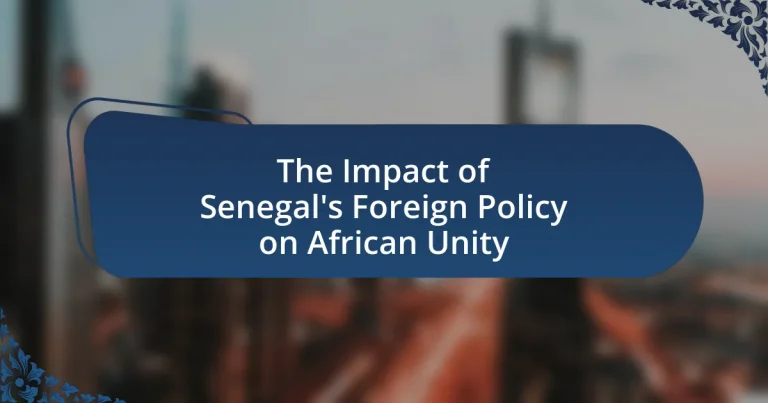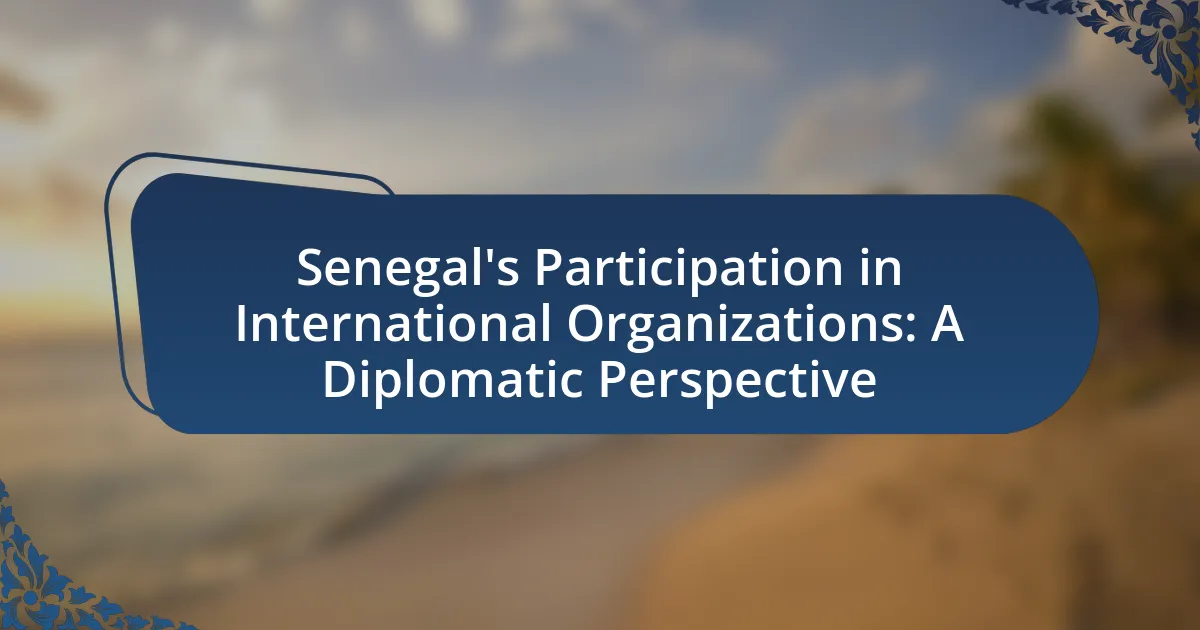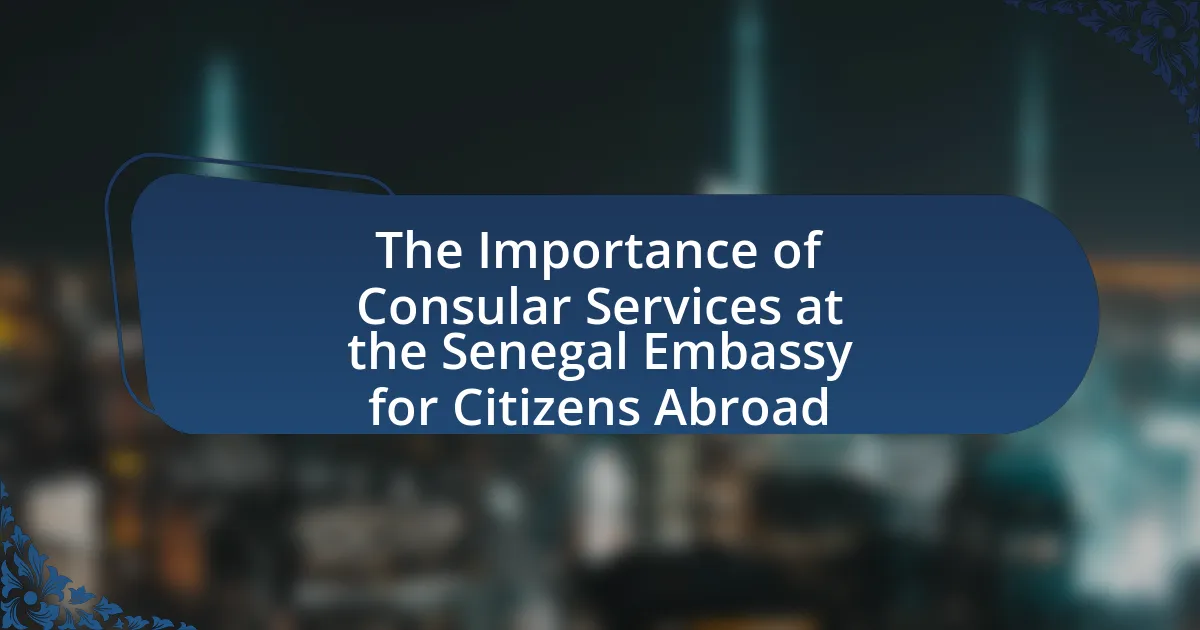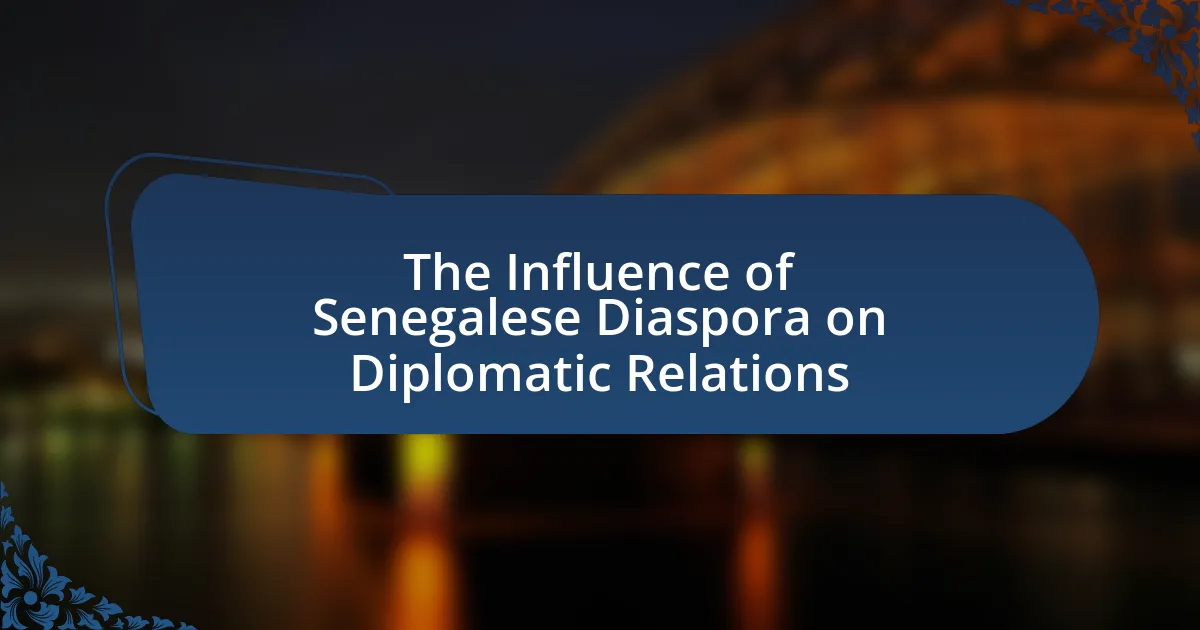Senegal’s foreign policy plays a crucial role in promoting African unity through regional cooperation and integration. The country actively engages in organizations such as the African Union and ECOWAS, emphasizing collective security and economic collaboration among African nations. Senegal’s historical context, shaped by its colonial past and commitment to Pan-Africanism, influences its diplomatic approach and objectives, which include fostering stability, enhancing economic partnerships, and advocating for solidarity among African states. The article explores the impact of Senegal’s foreign policy on regional integration, the challenges it faces, and the strategies it employs to navigate relationships with other African nations and global powers.
What is the impact of Senegal’s foreign policy on African unity?
Senegal’s foreign policy significantly promotes African unity by advocating for regional cooperation and integration. The country actively participates in organizations such as the African Union and ECOWAS, emphasizing collective security and economic collaboration among African nations. For instance, Senegal’s leadership in peacekeeping missions and conflict resolution efforts in West Africa demonstrates its commitment to stability and unity on the continent. Additionally, Senegal’s diplomatic relations with various African countries foster solidarity and mutual support, further enhancing the sense of unity among African states.
How has Senegal’s historical context shaped its foreign policy?
Senegal’s historical context has significantly shaped its foreign policy by fostering a commitment to regional stability and cooperation, rooted in its colonial past and post-independence leadership. The legacy of French colonialism instilled a sense of national identity and a desire for sovereignty, which influenced Senegal’s early foreign policy decisions, particularly under President Léopold Sédar Senghor, who emphasized Pan-Africanism and cultural diplomacy. This historical backdrop led Senegal to actively participate in the formation of the Organization of African Unity in 1963, promoting unity among African nations as a response to colonial fragmentation. Additionally, Senegal’s experience with political pluralism and democratic governance has positioned it as a mediator in regional conflicts, reinforcing its role as a stabilizing force in West Africa.
What key historical events have influenced Senegal’s diplomatic approach?
Senegal’s diplomatic approach has been significantly influenced by its historical events, particularly its colonial past, independence in 1960, and its role in the formation of the Organization of African Unity (OAU) in 1963. The colonial experience under French rule instilled a desire for sovereignty and self-determination, shaping Senegal’s commitment to non-alignment and multilateralism post-independence. The leadership of Léopold Sédar Senghor emphasized cultural diplomacy and Pan-Africanism, advocating for unity among African nations. Additionally, Senegal’s involvement in peacekeeping missions and mediation efforts in regional conflicts has reinforced its diplomatic stance as a stabilizing force in West Africa, reflecting its historical commitment to collective security and cooperation among African states.
How does Senegal’s colonial past affect its current foreign relations?
Senegal’s colonial past significantly influences its current foreign relations by shaping its diplomatic approach and alliances, particularly within Africa. The legacy of French colonialism has fostered a strong connection with France, leading to continued economic and cultural ties, which are evident in Senegal’s participation in the Francophonie and reliance on French investment. Additionally, Senegal’s historical experience with colonialism has instilled a commitment to pan-Africanism, driving its support for regional organizations like the African Union and ECOWAS. This commitment is reflected in Senegal’s active role in peacekeeping missions across the continent, demonstrating its dedication to African unity and stability.
What are the main objectives of Senegal’s foreign policy?
The main objectives of Senegal’s foreign policy include promoting regional stability, enhancing economic cooperation, and advocating for African unity. Senegal aims to be a leader in West Africa by actively participating in regional organizations such as ECOWAS and the African Union, which facilitates conflict resolution and peacekeeping efforts. Additionally, Senegal focuses on fostering economic partnerships through trade agreements and investment initiatives to boost development within the region. The country’s commitment to African unity is evident in its support for initiatives that strengthen collaboration among African nations, thereby contributing to a more integrated and cohesive continent.
How does Senegal prioritize regional stability in its foreign policy?
Senegal prioritizes regional stability in its foreign policy by actively engaging in diplomatic initiatives and peacekeeping missions across West Africa. The country has historically played a mediating role in conflicts, such as its involvement in the peace processes in Guinea-Bissau and the Ivory Coast, demonstrating its commitment to maintaining stability in the region. Additionally, Senegal is a founding member of the Economic Community of West African States (ECOWAS), which focuses on conflict prevention and resolution, further solidifying its dedication to regional peace and security.
What role does economic cooperation play in Senegal’s foreign policy goals?
Economic cooperation is central to Senegal’s foreign policy goals as it aims to enhance regional integration and economic development. By fostering partnerships with neighboring countries and international organizations, Senegal seeks to boost trade, attract investment, and promote sustainable development. For instance, Senegal’s participation in the Economic Community of West African States (ECOWAS) exemplifies its commitment to economic collaboration, which facilitates free trade and economic stability in the region. Additionally, Senegal’s strategic investments in infrastructure, such as the Dakar-Diamniadio Toll Highway, are designed to improve connectivity and economic ties with other West African nations, thereby reinforcing its role as a regional leader in promoting economic cooperation.
How does Senegal engage with other African nations?
Senegal engages with other African nations primarily through diplomatic initiatives, regional cooperation, and participation in multilateral organizations. The country is a founding member of the Economic Community of West African States (ECOWAS), which promotes economic integration and political stability among West African countries. Additionally, Senegal plays a significant role in the African Union, advocating for collective security and development across the continent. The Senegalese government has also been involved in peacekeeping missions in conflict zones, demonstrating its commitment to regional stability and unity. These actions reflect Senegal’s strategic approach to fostering collaboration and solidarity among African nations, thereby enhancing African unity.
What strategies does Senegal use to promote collaboration among African countries?
Senegal promotes collaboration among African countries through diplomatic engagement, regional integration initiatives, and active participation in multilateral organizations. The country emphasizes the importance of dialogue and cooperation, exemplified by its role in the African Union and ECOWAS, where Senegal advocates for collective security and economic development. Additionally, Senegal’s hosting of regional summits and forums fosters networking and partnership opportunities among African leaders, enhancing collaborative efforts on issues such as trade, security, and climate change. These strategies are supported by Senegal’s historical commitment to Pan-Africanism, which underscores its dedication to unity and cooperation across the continent.
How does Senegal’s membership in regional organizations influence its foreign policy?
Senegal’s membership in regional organizations significantly influences its foreign policy by promoting collaboration and stability within West Africa. Through its active participation in organizations such as the Economic Community of West African States (ECOWAS) and the African Union (AU), Senegal aligns its foreign policy with regional security initiatives and economic integration efforts. For instance, Senegal has contributed troops to ECOWAS peacekeeping missions, demonstrating its commitment to regional stability and conflict resolution. This involvement not only enhances Senegal’s diplomatic standing but also fosters stronger ties with neighboring countries, thereby reinforcing collective security and economic cooperation in the region.
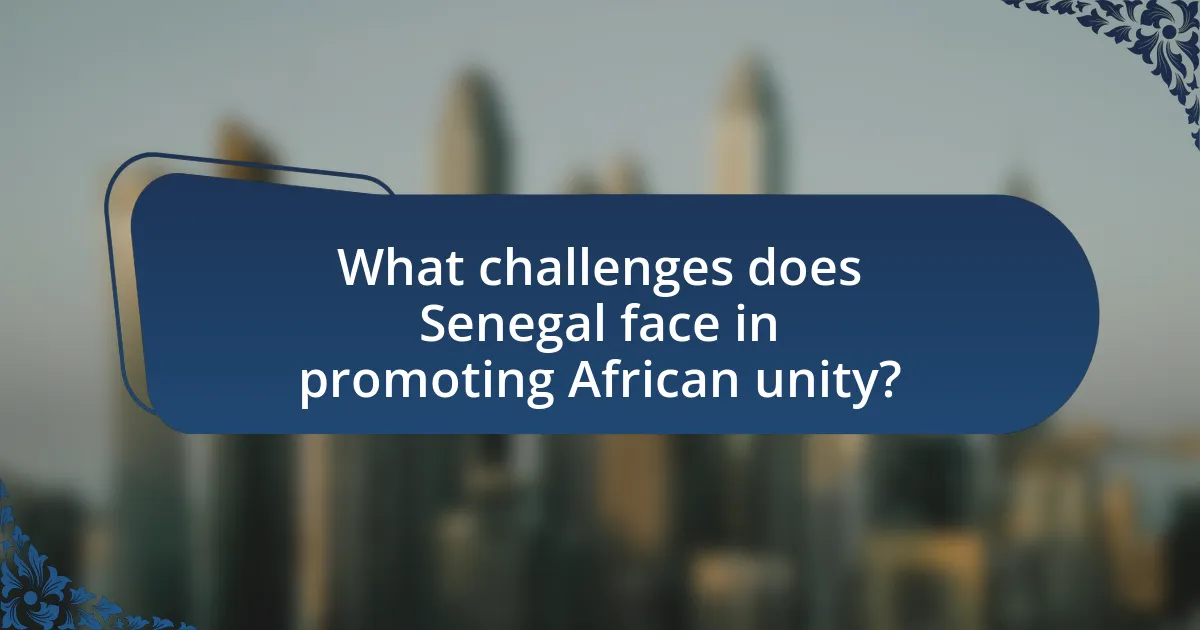
What challenges does Senegal face in promoting African unity?
Senegal faces several challenges in promoting African unity, primarily due to political, economic, and social factors. Politically, Senegal’s foreign policy is often influenced by its relationships with former colonial powers, which can complicate its commitment to pan-Africanism. Economically, disparities among African nations hinder collective action, as Senegal must navigate varying levels of development and resource allocation. Socially, ethnic and cultural diversity within Senegal and across the continent can lead to differing priorities and interests, making consensus difficult. These challenges are evident in regional organizations like ECOWAS, where Senegal’s efforts to foster unity are sometimes undermined by member states’ divergent agendas and conflicts.
How do geopolitical tensions affect Senegal’s foreign policy initiatives?
Geopolitical tensions significantly influence Senegal’s foreign policy initiatives by prompting the country to adopt a more proactive and strategic approach to regional stability and cooperation. For instance, Senegal has historically positioned itself as a mediator in West African conflicts, such as its involvement in the Economic Community of West African States (ECOWAS) peacekeeping missions, which reflects its commitment to maintaining regional security amidst tensions. Additionally, Senegal’s foreign policy has increasingly focused on strengthening ties with both Western and African nations, as seen in its partnerships with France and its active role in the African Union, to navigate the complexities of global power dynamics. This dual engagement allows Senegal to leverage its position to advocate for African unity and collective security, demonstrating how external pressures shape its diplomatic strategies.
What specific conflicts in Africa challenge Senegal’s diplomatic efforts?
Senegal’s diplomatic efforts are challenged by the conflicts in Mali, the Central African Republic, and the ongoing tensions in the Casamance region. The instability in Mali, marked by a coup in 2020 and ongoing jihadist violence, complicates Senegal’s role as a mediator in West Africa. In the Central African Republic, the presence of armed groups and humanitarian crises hinder Senegal’s ability to promote peace and stability. Additionally, the long-standing separatist conflict in the Casamance region poses internal challenges, as it affects national unity and complicates Senegal’s diplomatic positioning in regional matters.
How does Senegal navigate relationships with major global powers?
Senegal navigates relationships with major global powers through a strategy of diplomatic engagement and multilateralism. The country actively participates in international organizations such as the United Nations and the African Union, which allows it to advocate for African unity and development while fostering partnerships with nations like France, the United States, and China. For instance, Senegal has maintained a strong historical relationship with France, evidenced by military cooperation and economic ties, while also engaging with China through infrastructure investments, such as the Dakar-Diamniadio Toll Highway, which reflects Senegal’s balancing act between Western and Eastern influences. This approach not only enhances Senegal’s global standing but also contributes to regional stability and unity in Africa.
What internal factors impact Senegal’s foreign policy effectiveness?
Senegal’s foreign policy effectiveness is significantly impacted by its political stability, economic conditions, and institutional capacity. Political stability in Senegal, characterized by a history of democratic governance and peaceful transitions of power, fosters a conducive environment for diplomatic engagement and international cooperation. Economic conditions, including GDP growth and trade relations, influence Senegal’s ability to project power and attract foreign investment, which are crucial for effective foreign policy. Additionally, the institutional capacity of Senegal’s foreign affairs ministry, including its human resources and strategic planning capabilities, directly affects the formulation and implementation of foreign policy initiatives. These internal factors collectively shape Senegal’s role in promoting African unity and its effectiveness in international relations.
How do domestic political dynamics influence Senegal’s international stance?
Domestic political dynamics significantly influence Senegal’s international stance by shaping its foreign policy priorities and diplomatic relationships. The ruling party’s ideology, public opinion, and political stability directly affect how Senegal engages with other nations, particularly within the African Union. For instance, Senegal’s commitment to regional stability and peacekeeping efforts is often driven by its domestic political agenda, which emphasizes national unity and security. Additionally, the influence of opposition parties and civil society can lead to shifts in foreign policy, as seen during electoral cycles when leaders may adopt more assertive or conciliatory approaches to gain public support. This interplay between domestic politics and international relations is evident in Senegal’s active role in mediating conflicts in West Africa, reflecting its internal commitment to peace and cooperation.
What economic challenges does Senegal face that affect its foreign policy?
Senegal faces significant economic challenges, including high unemployment, reliance on agriculture, and vulnerability to external shocks, which directly influence its foreign policy. The high unemployment rate, particularly among youth, limits domestic stability and prompts Senegal to seek foreign investment and partnerships to create jobs. Additionally, the economy’s heavy dependence on agriculture, which accounts for a large portion of GDP, makes it susceptible to climate change and global market fluctuations, compelling the government to pursue trade agreements and regional cooperation to ensure food security. Furthermore, Senegal’s vulnerability to external shocks, such as fluctuating commodity prices and global economic downturns, necessitates a foreign policy that prioritizes economic diversification and resilience through international alliances and support.
What are the outcomes of Senegal’s foreign policy on African unity?
Senegal’s foreign policy has significantly contributed to African unity by promoting regional cooperation and diplomatic engagement. Through its active participation in organizations such as the African Union and ECOWAS, Senegal has facilitated dialogue and conflict resolution among member states, fostering a sense of solidarity. For instance, Senegal’s role in mediating conflicts in countries like Guinea-Bissau and Mali demonstrates its commitment to maintaining peace and stability in the region, which is essential for unity. Additionally, Senegal’s advocacy for collective economic initiatives, such as the African Continental Free Trade Area, aims to enhance intra-African trade and integration, further solidifying unity among African nations.
How has Senegal’s foreign policy contributed to regional integration?
Senegal’s foreign policy has significantly contributed to regional integration by promoting diplomatic relations and economic cooperation within West Africa. The country has actively participated in regional organizations such as the Economic Community of West African States (ECOWAS), facilitating trade agreements and conflict resolution mechanisms that enhance collaboration among member states. For instance, Senegal’s leadership in the establishment of the West African Monetary Union has fostered economic stability and integration by creating a common currency framework. Additionally, Senegal’s commitment to peacekeeping missions in the region has strengthened security cooperation, further solidifying ties among neighboring countries. These actions demonstrate Senegal’s role as a pivotal player in advancing regional unity and integration in West Africa.
What specific agreements or initiatives have emerged from Senegal’s foreign policy?
Senegal’s foreign policy has led to several specific agreements and initiatives, notably its active participation in the African Union (AU) and the establishment of the Senegalese Initiative for the Promotion of Peace and Security in West Africa. The Senegalese government has also been instrumental in the creation of the New Partnership for Africa’s Development (NEPAD), which aims to foster economic growth and development across the continent. Additionally, Senegal has engaged in bilateral agreements with various countries to enhance trade and security cooperation, such as the 2018 agreement with the United States to strengthen military and security ties. These initiatives reflect Senegal’s commitment to promoting African unity and stability through collaborative efforts and strategic partnerships.
How does Senegal’s foreign policy foster solidarity among African nations?
Senegal’s foreign policy fosters solidarity among African nations by promoting regional integration and cooperation through initiatives like the African Union and ECOWAS. This approach emphasizes collective security, economic collaboration, and political dialogue, which are essential for addressing shared challenges such as conflict resolution and economic development. For instance, Senegal has actively participated in peacekeeping missions across the continent, demonstrating its commitment to stability and unity. Additionally, Senegal’s diplomatic efforts, such as hosting the Dakar International Forum on Peace and Security in Africa, facilitate discussions that strengthen ties among African countries, reinforcing a sense of shared purpose and solidarity.
What lessons can be learned from Senegal’s approach to foreign policy?
Senegal’s approach to foreign policy teaches the importance of diplomacy, regional cooperation, and multilateralism in fostering African unity. By actively participating in organizations like the African Union and ECOWAS, Senegal demonstrates how collaborative efforts can address regional challenges and promote stability. Additionally, Senegal’s commitment to peacekeeping missions, such as its contributions to UN operations, underscores the value of shared responsibility in maintaining peace across the continent. These strategies highlight that effective foreign policy can enhance collective security and strengthen ties among African nations.
How can other African nations adopt Senegal’s strategies for unity?
Other African nations can adopt Senegal’s strategies for unity by prioritizing diplomatic engagement and regional cooperation. Senegal’s foreign policy emphasizes collaboration through organizations like the African Union and ECOWAS, which fosters collective decision-making and conflict resolution. For instance, Senegal’s active role in peacekeeping missions and mediation efforts in regional conflicts demonstrates a commitment to stability and unity. By emulating these practices, other nations can enhance their diplomatic relations and contribute to a more unified African continent.
What best practices can be identified from Senegal’s foreign policy experience?
Senegal’s foreign policy experience highlights several best practices, including diplomatic engagement, regional cooperation, and conflict resolution. Diplomatic engagement is exemplified by Senegal’s active participation in international organizations such as the African Union and the United Nations, which fosters dialogue and collaboration among nations. Regional cooperation is evident in Senegal’s role in the Economic Community of West African States (ECOWAS), where it has contributed to economic integration and political stability in West Africa. Furthermore, Senegal’s commitment to conflict resolution is demonstrated through its mediation efforts in regional conflicts, such as its involvement in peacekeeping missions in Guinea-Bissau and the Ivory Coast, which underscores its dedication to maintaining peace and security in the region. These practices collectively enhance African unity and demonstrate Senegal’s leadership in promoting collaborative approaches to regional challenges.
What practical steps can Senegal take to enhance its impact on African unity?
Senegal can enhance its impact on African unity by actively promoting regional integration through initiatives like the African Continental Free Trade Area (AfCFTA). By supporting the implementation of AfCFTA, Senegal can facilitate trade among African nations, which is crucial for economic collaboration and unity. Additionally, Senegal can strengthen diplomatic ties with neighboring countries by participating in and hosting regional summits, fostering dialogue on shared challenges such as security and climate change. Historical context shows that Senegal has been a leader in the Organization of African Unity (OAU) and its successor, the African Union (AU), indicating its commitment to continental unity. Furthermore, Senegal can invest in cultural exchanges and educational programs that emphasize Pan-Africanism, thereby nurturing a sense of shared identity among African nations.
